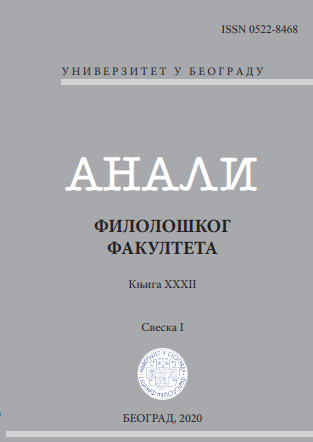Unlocking Trauma in Jonathan Safran Foer’s Extremely Loud and Incredibly Close
DOI:
https://doi.org/10.18485/analiff.2020.32.1.1Кључне речи:
trauma, 9/11 novels, Jonathan Safran Foer, Extremely Loud and Incredibly Close, acting out, working throughАпстракт
The paper presents an analysis of Jonathan Safran Foer's novel Extremely Loud and Incredibly Close in terms of the representation of trauma caused by the September 11 attacks that took place in New York in 2001. The novel's nine-year-old narrator Oskar Schell loses his father in the horrid event, which incites a traumatic experience. Aiming to mark the development of this experience, the paper employs the two following concepts: acting out and working through, which have been reintegrated into the field of trauma studies as such by Dominick LaCapra, and were initially Freudian terms (melancholia and mourning). The paper also comments on the belatedness in Oskar's experiencing trauma, an occurrence in realization that was explained by Sigmund Freud and reiterated by Cathy Caruth in her work concerning trauma. Following the analysis of Oskar's experience of trauma, the paper confirms his moving from the stage of acting out to that of working through, and concludes by confirming LaCapra's viewpoint, that a full closure might never occur.
Downloads
Downloads
Објављено
Број часописа
Рубрика
Лиценца

Овај рад је под Creative Commons Aуторство-Дели под истим условима 4.0 Интернационална лиценца.
Authors who publish with this journal agree to the following terms:
- Authors are confirming that they are the authors of the submitting article, which will be published (print and online) in the journal Anali filološkog fakulteta by the Faculty of Philology, University of Belgrade (Faculty of Philology, Studentski trg 3, 11000 Belgrade, Serbia). Author’s name will be evident in the printed article in the journal. All decisions regarding layout and distribution of the work are in hands of the publisher.
- Authors guarantee that the work is their own original creation and does not infringe any statutory or common-law copyright or any proprietary right of any third party. In case of claims by third parties, authors commit their self to defend the interests of the publisher, and shall cover any potential costs.
- Authors retain copyright and grant the journal right of first publication with the work simultaneously licensed under a Creative Commons Attribution-ShareAlike 4.0 International License that allows others to share the work with an acknowledgement of the work's authorship and initial publication in this journal.
- Authors are able to enter into separate, additional contractual arrangements for the non-exclusive distribution of the journal's published version of the work (e.g., post it to an institutional repository or publish it in a book), with an acknowledgement of its initial publication in this journal.
- Authors are permitted and encouraged to post their work online (e.g., in institutional repositories or on their website) prior to and during the submission process, as it can lead to productive exchanges, as well as earlier and greater citation of published work.





